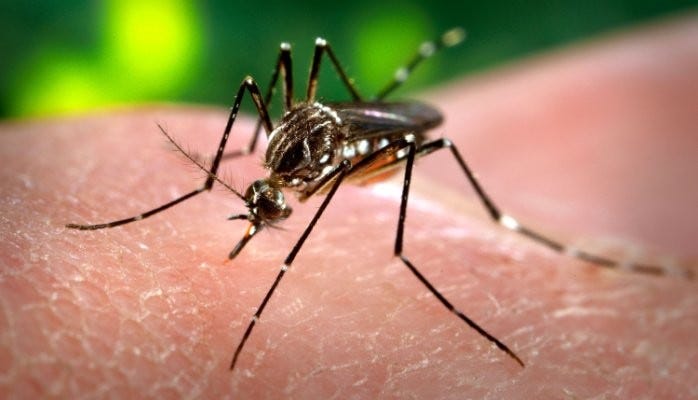Uh Oh! Another Pandemic Is Coming Our Way
A terrifying virus has been rapidly spreading through Brazil; it’s now migrating north and appears almost certain to arrive in the US later this year. Pregnant women should take notice.
The Zika virus, so named because it was first identified in Uganda’s Zika Forest in the 1940s, has been wreaking havoc in Brazil. The government estimates that 1.5 million Brazilians have been infected in the last 8 months.
For most, the mosquito-borne Zika virus is not particularly dangerous. Symptoms include fevers, red rashes, and pink eye; up to 80% of people infected with the virus experience no symptoms. But the real problem is not with children or adults; it’s with the newborn babies born to infected women.
These babies have shown high rates of microcephaly, a horrible neurological disorder in which infants are born with an abnormally small brain. The condition usually results in death or cognitive impairment. In 2014, Brazil had fewer than 200 cases of microcephaly; in 2015, as the Zika virus spread, approximately 3000 cases were recorded. Several areas in Brazil have declared a state of emergency. This is the first time the condition has been linked to the virus, for which there is no vaccine.
Because of the apparent danger to fetuses, women in several countries are being urged to delay having children. In Colombia, Ecuador, and Jamaica, officials have cautioned women against pregnancy; and in El Salvador, the government is urging women to wait for up to two years before getting pregnant. If the advice is followed, it’s possible that population trajectories in these countries might materially differ from prior projections.
Zika virus infections have occurred across the Americas, including in Brazil, Venezuela, Colombia, Mexico, and Puerto Rico. On Monday, the World Health Organization warned that the virus would likely spread through most of North and South America, including the United States. Officials are increasingly concerned that the virus could spread rapidly in the US this summer, particularly in the swampy, mosquito-dense Gulf Coast region. The Zika virus would join a number of mosquito-borne diseases, including dengue, West Nile, and chikungunya, that have reached the US in recent decades.
Pronouncements guiding pregnant women away from infected areas are increasingly common. Expect more guidance to emerge. The US Center for Disease Control (CDC) has cautioned pregnant women to "consider postponing travel to any area where Zika virus transmission is ongoing.” This includes countries in the Caribbean such as the US Virgin Islands, Puerto Rico, Barbados and St. Martin. There are currently more than 20 countries identified by the CDC with Zika cases.
Why is this happening? First, there’s globalization and urbanization. Researchers recently argued in the New England Journal of Medicine that "urban crowding, constant international travel, and other human behaviors combined with human-caused micro-perturbations in ecologic balance can cause innumerable slumbering infectious agents to emerge unexpectedly. Second, there’s climate change, which might contribute to outbreaks of viruses like Zika by allowing pathogen-bearing mosquitos to expand into newly-warmed territory. They have larger regions in which to expand for longer seasons.
As the global public health community scrambles to develop a means to address the Zika threat, let’s not forget that our actions fighting the virus today are going to have long-lasting economic ramifications. Case in point: Brazil.
Our actions fighting the Zika virus today are going to have long-lasting economic ramifications.
Just think about the upcoming summer Olympics that begin in Rio de Janeiro this August. Scientists are already urging pregnant women to consider skipping the games. If the virus has not been contained by this summer, it could cast a dark cloud over an already-struggling Olympics and a battered Brazilian economy. As the country fights a severe recession and political chaos, a rapidly spreading pandemic of a terrifying virus is a particularly unwelcome development.
There’s also the population impact of delayed and discouraged pregnancies. Cautioning entire cohorts of women to put off childbearing for years could impact the demographic trajectories of countries, adversely affecting their economic prospects. In a region like South America, where birthrates are already plummeting, a one-off decline in birth rates could only accentuate the economic pain of such a demographic transition.
The Zika virus has the potential to impact emerging markets, demographics, and even Caribbean tourism. It’s simply too important to ignore, and for anyone seeking to navigate our increasingly uncertain future, it’s critical we constantly scan the horizon for potential needle-moving developments. Zika appears to be one. I hope I’m wrong.
Vikram Mansharamani is a Lecturer at Yale University in the Program on Ethics, Politics, & Economics. He is the author of BOOMBUSTOLOGY: Spotting Financial Bubbles Before They Burst (Wiley, 2011). Visit his website for more information or to subscribe to his mailing list. He can also be followed on Twitter or by liking his Page on Facebook.





